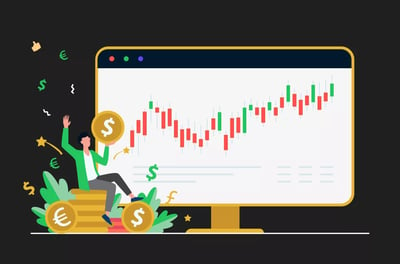Table Of Contents
- The Potential of FOREX Trading
- Key Factors Impacting FOREX Profitability
- Leverage:
- Currency pairs:
- Economic and geopolitical events:
- Trading strategy:
- Common Mistakes that Erode Profitability
- Overleveraging and poor risk management:
- Emotional trading decisions:
- Failing to keep updated with market news:
- Tools and Strategies for Enhancing Profitability
- Technical analysis:
- Signals:
- Fundamental analysis:
- Risk management:
- The Role of FOREX Brokers
- How brokers can impact trading costs and profitability:
- The platform:
- The fees:
- Regulation:
- Realistic Expectations and the Long Game
- Let’s Recap
Is FOREX Trading Profitable?
From my experience, the lure of FOREX has always been the attraction of buying and selling currencies in the largest financial market in the world. With daily trading volumes exceeding $7 trillion, it is a truly global marketplace. Major financial institutions, multinational corporations, governments, and individual traders are all actively taking part.
Anyone can participate in this 24-hour marketplace with low barriers to entry. After all, you can trade with as little as a few dollars. Keen to be a part of the action, many would-be traders ask, “Is FOREX trading profitable?” The straightforward answer is yes. Many traders generate profits from trading currencies. However, many more lose money than gain money. Trading FOREX requires a combination of knowledge, strategy, discipline, and, often, a bit of luck. Let me suggest to you how you can increase your chances of making money. But, firstly, I should mention that this is not financial advice, merely the benefit of my personal trading experience.
FOREX trading is profitable for some, but comes with high risk and more losers than winners
The $7 trillion daily trading volume offers unmatched liquidity and the ability to trade 24/5
Leverage can magnify gains but also accelerates losses if you don’t carefully manage risk
Profits can be made whether currencies rise or fall as long as the right pair is traded
Emotional trading and ignoring market news are common pitfalls that erode profitability
Strong strategies that blend technical and fundamental analysis help traders make better decisions
Broker fees, spreads, and platform performance directly affect your bottom line
Long-term success depends on patience, discipline, ongoing learning, and realistic expectations

The Potential of FOREX Trading
As I've mentioned, this $7 trillion-a-day market is so large it dwarfs the combined daily trading volumes of all the world's stock markets. Why is this important? Liquidity. High liquidity means that trades can be executed quickly without major slippage, which is when a trade cannot be executed because there is no buyer for the assets you are selling. Slippage occurs in slow-moving markets that are illiquid.
If you liquidity is not a big deal, try being a penny stocks trader. Penny stocks typically refer to shares of smaller companies that trade for less than $5 per share and are often listed on over-the-counter (OTC) markets rather than major exchanges like the NYSE or NASDAQ. These stocks are illiquid because they generally have low trading volumes, meaning fewer buyers and sellers participate in these markets.
On the other hand, high liquidity markets lead to smoother price movements and more consistent spreads. If you want to know more about spreads, read our article here. So, the real potential of the FOREX world is that you can enter or exit positions whenever you choose. This means you can trade as often and for as long as you like, potentially making good money if you work the markets well.
Who wouldn't want to participate in this dynamic market? One of the other great things about the FOREX market is that you can make money regardless of market direction. Unlike some markets where traders primarily profit from rising asset prices, the FOREX market's very structure—trading currency pairs—means that you can capitalize on both rising and falling currency values. This fact, along with the high liquidity and lightning-fast modern platforms, means that the FOREX market is the place to be.
Key Factors Impacting FOREX Profitability
Once you start working in this market, you will come to learn the holy grail, in my opinion, of the four biggest factors that affect its profitability:
Leverage:
Leverage gives you the ability to control a large position with a relatively small amount of capital. Further, it’s not all your money! Most of it belongs to your broker, who hands you over some of its capital so you can enter bigger trades.
However, it's a double-edged sword. You can lose big or win big. Leverage can enhance earning potential, but it also increases the risk. Traders must be careful about how they use it, and thankfully, regulators and brokers do their best to stop traders from abusing leverage to their own detriment. But it’s still a very attractive feature of trading.
Currency pairs:
To thrive here, you should learn how to navigate majors, minors, and exotics.
Major pairs involve the most-traded currencies globally, often paired with the US dollar, such as EUR/USD or USD/JPY. Because of their high liquidity, they often come with tighter spreads and are less volatile.
Minor pairs do not include the US dollar, but involve other major currencies, like EUR/GBP. Exotic pairs, on the other hand, pair a major currency with a currency from a smaller or emerging economy, such as USD/TRY (US dollar/Turkish lira). Exotics can offer significant profit potential due to their higher volatility, but they also come with increased risks and wider spreads. The big advantage of this is that by combining trades in major, minor, and exotic currencies, there is always some form of action to partake in, be it rising or falling markets.
Economic and geopolitical events:
The value of currencies is heavily influenced by economic and geopolitical events. Interest rate decisions by central banks can sway currency values substantially. Economic data releases, such as employment figures, GDP growth, and inflation rates, can provide insights into a country's economic health and, in turn, affect its currency's strength or weakness. This is why the most successful traders stay close to the news.
Think about the last ten years alone. The Turkish lira, Argentine peso, and Venezuelan bolivar all weakened markedly due to internal political and economic challenges. By contrast, the Swiss franc surged in price when it stopped being pegged to the euro, and the US dollar has similarly appreciated due to pro-growth monetary policy.
Trading strategy:
I would definitely say that having a well-defined and tested trading strategy is vital for anyone looking to navigate the FOREX market successfully. It’s really what will separate you from the rest. A robust trading strategy gives you a systematic approach to the market, dictating when to enter and exit trades based on predetermined criteria, be they technical indicators, fundamental analysis, or a combination of both. Taken together, these four factors are what can make your trading journey more lively and potentially profitable.
Common Mistakes that Erode Profitability
So, what are the factors that can hamper your success the most?
Overleveraging and poor risk management:
As I mentioned, leverage is a powerful tool, but it can be dangerous if misused. It’s always best, especially early in your trading career, to be crystal clear about the risk management techniques you want to use. Yes, you are trading with house money to a certain extent, but when you lose on leverage, you can lose big. If you want to learn more about how to develop a robust trading plan, read our article here.
Emotional trading decisions:
It’s human nature to experience FOMO, the fear of missing out. The FOREX market moves so rapidly that it can evoke strong emotions in traders. You could see a currency go on a bull run and feel as if you are missing out. These emotional reactions often contradict your established strategy, leading to inconsistent results and potential losses. There, understanding your trading psychology will help you curb emotional trading.
Failing to keep updated with market news:
Yes, some traders have become rich from trading FOREX. It’s alluring to think if someone else has done it, why can’t you, too? What many people don’t understand is the work it takes to become a successful trader over time. One of the cardinal rules you should always observe as a trader is that you cannot ignore the news. Think of the news as a rolling feed of trading clues and signals. If you don’t follow the news, you are trading in the dark.
Tools and Strategies for Enhancing Profitability
In my experience, you aboslutely must understand the following areas to have the best chance of success:
Technical analysis:
Traders who employ this method analyze indicators, oscillators, and patterns—from moving averages to candlestick formations—to understand potential trends and entry or exit points. If you spend time on this, you may be able to reasonably predict where the price will move next, meaning your trades are more informed.
Signals:
At Arincen, we have developed a powerful signals package. Signals form part of social trading. We’ve created a network that offers a one-stop digital hub that unites traders and market experts from around the globe. Founded by seasoned professionals in finance and currency markets, Arincen serves as a communal platform for sharing insights, evaluating trading firms, and accessing a comprehensive suite of trading tools and services.
Fundamental analysis:
I have come to learn that this form of analysis delves deep into the economic, social, and political forces that drive supply and demand for currencies. Instead of focusing solely on charts, fundamental traders interpret data like interest rates, national debt levels, GDP growth, employment figures, and geopolitical events to determine a currency's inherent value.
Risk management:
It’s important to make the most of tools like stop-loss and take-profit orders. A stop-loss order limits your losses by automatically closing a position once it reaches a predetermined unfavorable price, while a take-profit order locks in profits at a set favorable price. Having a prudent approach to risk management can prolong your trading career.
Recommended Brokers
The Role of FOREX Brokers
How brokers can impact trading costs and profitability:
I will tell you that brokers play a massive role in determining the trading experience and the profitability of traders. Brokers give you the platform and tools to access the FOREX market, but this comes at a cost in the form of spreads, commissions, and sometimes hidden fees. These costs can quickly add up and eat into potential profits. It’s hard to choose a good broker. To make that choice a little easier, see our article here on some of the best brokers.
The platform:
Another way a broker impacts your profitability is by how efficient, fast, and reliable its trading platform is. This can affect execution times and prices, influencing trading outcomes. A platform that offers seamless execution, real-time data, and minimal downtime can be the difference between capitalizing on a trading opportunity and missing it entirely. One such example of a trustworthy platform for FOREX trading is MT4. This is why the choice of broker can significantly impact both the immediate trading costs and the long-term profitability of a trader.
The fees:
In the world of FOREX trading, every pip counts. Tight spreads directly affect the break-even point of a trade and have a large bearing on profitability. Brokers that offer tight spreads can significantly reduce trading costs. Similarly, low commissions ensure that a larger portion of the profits stays in your pocket.
Regulation:
In my view, as you are entrusting your money to a broker whose claims and authenticity you must believe, it's best to do your research. The broker’s security and transparency are vital. Regulated brokers operate under the scrutiny and guidelines set by regulatory authorities, ensuring they uphold industry standards in terms of capital adequacy, client-fund segregation, and fair trading practices. At Arincen, we’ve written many articles about why you should choose brokers under the control of the best regulators. Read one here.
Realistic Expectations and the Long Game
My question to readers of this article is: What’s realistic for you as a FOREX trader? Get Rich Quick is a myth. The allure of the FOREX market is often heightened by rags-to-riches stories of traders turning small sums into fortunes overnight. This is an unrealistic picture of the trading landscape. While the market does offer lucrative opportunities, it's far from a guaranteed pathway to instant wealth.
Many successful traders have faced their share of losses and setbacks before achieving consistent profitability. It's essential for new traders to approach the market with caution and realistic expectations, understanding that, like any investment, FOREX trading carries risks and there's no surefire formula for overnight success.
Success in the FOREX market isn't solely about making accurate predictions. It's just as much about your mindset and approach. Patience, for instance, is crucial, allowing you to wait for the right opportunities rather than rushing into ill-timed trades.
Continuous learning helps you stay adaptive, understanding new patterns, tools and market changes. More than that, having a long-term strategy provides a roadmap, guiding your decisions and ensuring you stay aligned with your broader goals.
Let’s Recap
My final analysis is that FOREX trading can certainly be profitable, but it requires a combination of knowledge, strategy, discipline, and the right tools. As a new or experienced trader, never forget the importance of continued education and hands-on practice.
I highly recommend that you enter the market with a realistic mindset. Yes, the FOREX market offers vast opportunities, but it also comes with its own set of challenges. Many a trader has fallen by the wayside. By equipping yourself with the right skills, partnering with the right broker, and keeping a grounded perspective informed by a strong trading strategy, you can ride the ebbs and flows of this dynamic market more effectively and maybe even make some good money.
FAQ
Yes, it is possible to make money trading FOREX. However, it requires a combination of education, strategy, discipline and risk management. While some traders achieve significant profits, others may face losses. It's essential to approach FOREX trading as a skill to be developed rather than a quick way to wealth.
You can start trading FOREX with relatively small amounts, often even less than $100 with some brokers. However, starting with a small capital limits your potential position size and risk diversification. It's crucial to only trade with money you can afford to lose.
Leverage allows traders to control a large position with a small amount of money. Look at it this way, with a leverage of 100:1, you can control a $100,000 position with just $1,000. While this can amplify profits, it can also magnify losses, making it essential to use leverage cautiously and understand its implications.
Spreads (the difference between the buy and sell price) and commissions are costs associated with trading. Tighter spreads and lower commissions mean lower transaction costs, which can make a significant difference in profitability, especially for active traders.
Minimizing risk involves a combination of strategies, including setting stop-loss orders to limit potential losses, only risking a small percentage of your capital on a single trade, diversifying your trades and continuously educating yourself about the market.
Absolutely! A demo account allows you to practice trading in a risk-free environment with virtual money. It's an excellent way to understand market dynamics, test strategies, and become familiar with trading platforms without risking real capital.
A trading strategy is paramount. It provides a systematic approach to identify entry and exit points, manage risk and achieve consistent results. Trading without a well-defined strategy can lead to impulsive decisions driven by emotions, which often result in losses.






